If you choose the right website builder, creating your website isn’t difficult at all. And you won’t even need to learn how to code with these options.
Ten years ago back when I was first starting to build websites, it was a completely different story—but today, all of the best website builders are completely visual (meaning you won’t have to write a single line of code) and extremely easy to learn, build and publish on.
In this detailed breakdown, we’re comparing all of the best website builder options on the market today.
12 Best Website Builders for Bloggers and Business Owners (Easy to Use) in 2024
- WordPress.org
- Wix
- Squarespace
- Shopify
- WordPress.com
- Webnode
- Weebly
- Brizy Builder
- Format.com
- WooCommerce
- BigCommerce
- Pixpa
Disclosure: Please note that some of the links below are affiliate links and at no additional cost to you, I may earn a commission. When you purchase website hosting using one of my affiliate links, the company compensates me, which helps keep all of my content (like my ultimate comparison of the best hosting plans) free of charge to you. Know that I only recommend tools I’ve personally used and stand behind.
Now quickly, before we dive into our comparison of the best website builders (without coding) for bloggers and business owners today, let’s talk about what you need to look for in your website builder of choice.
What is a Website Builder?
A website builder is a software tool that allows you to easily build a website without needing any coding skills. The best website builders offer visual, drag-and-drop functionality that allows you to effortlessly create the pages on your website.
Apart from the obvious benefit that a website builder helps you to build your website with little effort, website builders also come with advantages like:
- Creating a professional website on a budget. Getting a professional-looking website is no longer a matter of hiring a pricy web developer. A good website builder will help you create your own site without spending much at all.
- Saving you time. Building your own website takes a matter of only a few hours of your time with the best website builder.
- Extensive customization capabilities. The best website builders allow you to customize your website to suit your own purpose and visual styles.
Before we dive into my breakdown of the best website builders for bloggers, let’s look at the qualities you need to evaluate before deciding upon a website builder.
So what makes one of these tools qualified to be considered among the best website builders?
Ease of Use in a Website Builder
Ease of use—how quickly you’ll be able to learn and create your website—is one of the most important factors you need to consider when evaluating a website builder.
Especially if you’re learning how to start a blog, I recommend only considering a website builder with intuitive design tools and easy-to-use drag-and-drop features where you won’t ever need to write a line of code. The website builders on this list here today are all very easy to use and learn.
Extensive Theme and Template Library
Another very important feature you need to look for in a website builder is an extensive template, theme, and image library.
This is the core feature that’ll help you customize the look and feel of your website—and give you starter layouts to hit the ground running with (like the ones that come with the Elementor WordPress website builder I personally use).
Most people confuse themes and templates when it comes to website building, but the main difference in WordPress (a website builder we’ll be talking about soon), is that a theme is the complete overall design of your website. A template, on the other hand, dictates the layout style of an individual page on your website.
Both your theme and page templates—which are components of the website builder you choose—can be tweaked & customized.
Robust SEO Features
Particularly relevant if you want to eventually monetize your blog, SEO (Search Engine Optimization) plays a major role in making sure your website is properly optimized to drive traffic from the search engines.
The best website builders for bloggers all have robust and easy-to-customize SEO features, which enable your website to have a better chance of ranking high in search results.
Fast Load Times and High Uptime
To ensure that visitors to your website have a great experience, you need to guarantee that you get a fast-loading website builder. According to Google, websites that load slowly (in 3 seconds or more) have as much as a 123% probability of visitors immediately leaving. It’s pointless to design a beautiful website, and work to drive tons of traffic to it, only to have those readers bounce.
Apart from fast load times, the best website builders also have high uptime (meaning that your website consistently stays visible on the Internet)—as close to 100% uptime as possible.
Mobile Responsive
Today, about half of all internet traffic comes from mobile devices, and it’s only increasing—making it crucial to choose a website builder that offers a foundational layout that’s mobile responsive (automatically adjusts the layout of your website for different screen sizes).
Increasingly, your website must display as well on mobile devices—as it does on desktop and tablet devices. Don’t worry much about this one though, as my list of website builders for bloggers here only includes website builders that are mobile responsive. Those that aren’t mobile responsive shouldn’t even be a consideration today.
Now without further delay, let’s dive into my picks for the best website builders!
12 Best Website Builders for Bloggers and Business Owners (Easy to Use) in 2024
Picking the right website builder for your blog (even from a list like this) can feel like a daunting task given all of the different options out there.
Having been in the blogging world myself for nearly a decade, I’ve had the opportunity to test each of these first hand though. And for 90% of new website owners, the best option is going to be #1 here on this list.
Now, let’s get you to the best website builder for your needs.
1. WordPress.org
WordPress.org, not to be confused with WordPress.com (we’ll take a look at the .com version later), is hands down the most popular website builder for bloggers.
Best for: Anyone who wants to start a blog on a budget—or otherwise make a website that has the potential to generate income online. Self-hosted WordPress as a website builder is not only the most affordable way to create a beautiful site but will also give you the highest level of customizability, lowest overall costs, the most search engine-friendly (SEO) foundation, and an easy-to-use building experience.
In fact, the (free) .org version of WordPress powers more than 34% of the internet—making it the website builder of choice for everyone from bloggers to small business owners, media companies, publishers, and more. It’s also the website builder I use to power my blog right here.
So what makes WordPress.org a blogger favorite?
Well for starters, this version of WordPress is free to use and is a content management system (CMS) that’s open-source & self-hosted.
WordPress.org was created before WordPress.com and is the version people are talking about when they recommend “using WordPress.” It’s also often referred to as self-hosted WordPress when reading through guides like mine about how to start a blog.
The software powering this website builder is free to the public, meaning that WordPress requires no money from you whatsoever.
However, with WordPress.org, you get a self-hosted blog—so you’ll need to pay for a hosting company to “host” your website, which is what makes it live and visible on the Internet.
Hosting is very affordable though, and I personally recommend Bluehost, one of the longest-standing companies in the WordPress web hosting space, for getting a domain name and hosting set up.
While some of the other website builders we highlight here today offer an all-in-one solution (both hosting + building tools), opting for a self-hosted WordPress website, powered by a hosting company like Bluehost will be by far the most affordable, customizable, and long-term best option.
It’s also the most sustainable and safest long-term solution to make a website—because you’re not dependent upon a particular website builder still being in business 5 years from now.
This is the website builder I personally recommend to every friend who’s considering creating a website or blog of any kind.
Now, let’s look at the pros and cons of choosing self-hosted WordPress as your website builder.
Pros of Self-Hosted WordPress
- Easily and fully customizable. With self-hosted WordPress, you can truly build any kind of website you want. From both free and paid options of WordPress themes, templates, and plugins to get you started, this website builder gives you the most amount of control over your website design.
- Extensive range of features. Whether you want to create an online store, blog, community forum, or paid membership area, WordPress comes with features (and a network of developers who make free & paid add-ons) that allow you to turn your website into the kind of money-making endeavor you want.
- A limitless number of plugins. Think of WordPress plugins for your website as being like the apps you have on your smartphone—plugins allow you to extend the functionality of your website. And people have built WordPress plugins (either free or inexpensive) to do anything you’ll ever need.
- Powerful SEO foundation. WordPress comes built-in with a well-constructed framework for giving your website a powerful search engine optimization starting point. With the installation of free SEO plugins like RankMath SEO or Yoast SEO, you can fully optimize your website with crucial recommendations and suggestions that’ll get your content ranking higher in search results.
Cons of Self-Hosted WordPress
- There’s a learning curve. One of the only potential drawbacks of choosing WordPress as your website builder is that it can come with a bit of a learning curve. Other website builders on this list (that have far fewer customization capabilities) will be easier to learn at first. But still, the learning curve is nothing that can’t be quickly overcome with the right learning resources, tutorials, and video walkthroughs…
Head over to my (free) tutorial that’ll walk you through the process of starting a blog using self-hosted WordPress as your website builder, powered by very affordable hosting and free themes & plugins.
Want to Build Your Website with WordPress?
Follow along with my 3 Easy Steps to Make a Website.
Pricing for Self-Hosted WordPress
Perhaps the original reason why WordPress became so popular, is the fact that the software is free.
However, you do need to pay for securing your domain name (the name of your website—its address on the Internet) and hosting.
This is where a web hosting service like Bluehost comes in.
Why Bluehost? They’re an extremely easy-to-use, inexpensive web hosting service that comes with a few big advantages for WordPress users:
- Unbeatable hosting cost (typically as low as $1.99/month)
- Free domain registration is included in your hosting plan (valued at $14.99/year)
- Free SSL certificate that gives your website visitors a secure browsing experience
- 1-Click installation of WordPress right after choosing your hosting plan
- 24/7 technical support over the phone, via email, or live chat
- A 30-day money-back guarantee if things don’t work out
Especially because Bluehost includes an automatic WordPress installation and technical support, you get a really good deal with their hosting plans.
Add a free WordPress theme (like Elementor) and you’ll be able to build a beautiful website in an afternoon—without any hassles. Here’s a preview of the Elementor WordPress theme I recommend to all new website owners:
WordPress is my pick for the best website builders for bloggers—as millions of bloggers around the world will tell you.
So, if your main online activity is going to be blogging or creating regular content with the goal of attracting visitors to your website, then this is the website builder I’d recommend you build your blog on. I use WordPress on many sites, including my new side project, VeganTable, where I’ll be documenting my journey going vegan.
If you’re ready to get started with your own self-hosted WordPress website, head on over to my (free) 3-step tutorial on how to make a website today.
2. Wix
Although it has gained much more popularity in recent years, Wix has actually been around as a website builder since 2006.
Best for: Small business owners who want a good-looking, relatively simple website that’s easy to create, without a ton of fancy features or functionality. If you plan on blogging, collecting email subscribers to market to, or eventually selling products from your website, you’re better off with another website builder on this list.
Now regularly ranking amongst the best website builders for bloggers and small business owners, Wix solidifies its place on this list because it’s an incredibly easy-to-use platform—thanks to its super intuitive drag-and-drop functionality that powers the website builder once you create your account.
Apart from their drag-and-drop builder, what else makes Wix so popular amongst the more than 110 million other bloggers using their website builder today?
Pros of Wix
- One of the best drag-and-drop builders on the market. The engineers at Wix have done an amazing job of making their tool suite a true drag-and-drop website builder that can be learned and mastered in a matter of minutes. Just about every visual element of your website can be manipulated with a click of the mouse.
- Easy to customize. While the customization options using a website builder like Wix will be more limited than what you can ultimately achieve with a self-hosted WordPress website, you can still set up a very unique website quickly with Wix using their library of templates and other third-party apps. Their AI-powered design tool even helps make light work of whipping up beautiful website elements based on your preferences.
- Highly responsive templates. With more and more traffic coming from mobile devices, Wix’s mobile-ready templates are a core feature of the product.
- Free and paid options are available. The free version of Wix is a great way of testing whether or not Wix will ultimately be the best website builder for your needs.
- Awesome customer support. Like most website builders, Wix offers a hands-on level of support ranging from a massively in-depth library of tutorial articles & videos, all the way up to 24/7 live phone support.
Cons of Wix
- Limited apps for customization. Wix runs on their own internally built native applications & features, of which there isn’t a wide selection to choose. That being said, their collection of apps is still growing quickly.
- Switching templates after your website is live gets very difficult. Giving your site a visual makeover after it’s gone live live can be a time-consuming endeavor. While the initial website building process is easy using Wix, switching to a different layout is like starting completely over.
- Limited eCommerce features. While your Wix website will look visually appealing, it won’t work as seamlessly for eCommerce purposes as other platforms like Shopify or any number of these best eCommerce website builders.
Pricing for Wix’s Website Builder
While Wix starts out as technically free, paid plans are also available if you want to remove Wix ads and branding (you’ll definitely want to do this).
Their paid plans also help you add more functionality, scale to allow more visitors,
So how much does Wix cost?
Their paid plans start at $4.50/mo for the baseline level that includes hosting your website on its own unique domain—and can go up to as much as $24.50/mo to unlock more features like additional file storage, a speed boost, and priority support.
If you’re looking for a super easy-to-use and functional website builder, then shortlist Wix as one of the best website builders for you to consider in your search.
Though Wix will initially be a little easier to set up your website, you’ll be ultimately much better off with a self-hosted WordPress website from both a cost and functionality standpoint.
3. Squarespace
Founded in 2003, Squarespace is another widely recognized website-building platform that’s earned its rank amongst the best website builders for bloggers.
Best for: Freelancers that want a visually appealing, mostly static website (a small number of pages with little expected change moving forward). While not the best website builder to choose if you plan to blog regularly due to a lack of customizability, their content publishing tools are stronger than Wix’s.
Creating your website with Squarespace is a breeze (even without writing a line of code) as it has one of the most intuitive and easy-to-use drag-and-drop builders on the market.
So if you want to set up a beautiful website for your business—and maybe blog a little bit here and there—then Squarespace is definitely a top option to consider.
Let’s take a look at what makes Squarespace the website builder of choice for the close to 2 million users running their websites on the platform.
Pros of Squarespace
- Best in class drag-and-drop builder. For a fast, do-it-yourself website build that needs to happen in a weekend, you can’t go wrong with Squarespace.
- Solid design. Squarespace makes your website look professional and gives it a custom feel. No one will be able to tell you designed your website yourself.
- Exceptional performance. Squarespace websites load lightning fast and have a 99.98% uptime on average.
- Beautiful themes. Professional, clean, and beautiful themes are one reason Squarespace has a big customer base—especially among website owners that need to publish a lot of images.
Cons of Squarespace
- Average customer support. By no means do they have bad customer support, but you’ll be limited to either live chat during business hours or email-based support which can take you longer to resolve technical issues (that are often pretty time-sensitive).
- Limited integrations and features. Their website builder is pretty limited (especially compared to self-hosted WordPress) when it comes to adding features and functionality beyond just a good-looking, mostly static website.
Pricing for Squarespace’s Website Builder
When it comes to pricing, Squarespace treats websites and online stores differently.
- A personal website will cost you either $16.00/mo or up to $23.00/mo if you want access to advanced website analytics for your site.
- An online store will set you back between $23.00/mo and $49.00/mo to unlock the ability to sell products from your website.
Squarespace definitely ranks high among the best website builders for business owners to get started with, but most people will eventually migrate to a self-hosted WordPress site once they’ve started to get traction and see their blogs growing. Oh and this Squarespace review goes into even greater depth, so I’d highly recommend reading along if you’re considering this website builder.
Considering that it does have one of the best drag-and-drop builders on the market though, it’s still worth evaluating.
4. Shopify
Shopify is a website builder that leans heavily on helping you to create a well-optimized online store. Like all of the other website builders on our list, it comes with easy customization options, but with Shopify, those are geared toward helping you sell more products from your website.
Best for: Business owners that want to sell products from their website. With the explosion of eCommerce onto the scene as a more accessible business to start today, Shopify has risen to the top among website builders that are specifically designed to help online business owners convert more visitors into paying customers.
With a wide range of templates and support from a lot of great apps and third-party plugins, you can easily create an eCommerce store that matches your brand and visual preferences.
Shopify is likely the most-used eCommerce website builder available on the market today—and they’ve invested a ton of their own resources into creating extremely in-depth training resources, blog content, guides, video training and more to help their customers become successful with an eCommerce business.
All of this combined makes them my pick for the best website builder for bloggers who want to venture into selling products on their websites. And yes, you can also publish regular content to your own blog with a Shopify-powered website (though the features and customizability lag far behind that of self-hosted WordPress).
Let’s quickly explore a few factors that make this website builder a fan favorite among eCommerce aficionados.
Pros of Shopify
- Optimized for eCommerce. Shopify makes it easy to set up an attractive online shop that’s beautiful from a customer perspective and very easy to manage. That’s by far the biggest use case for choosing this website builder.
- Reporting. Data should be the lifeblood of every online business. Shopify has an excellent reporting feature that gives you all the data you need to strategically grow your business, ranging from insights into your website visitors to cart abandonment rates and much more.
- Staff accounts. As your website grows over time, staff accounts allow you to set different permission levels that grant access to those helping you run your store.
- Straightforward payment gateway systems. Unlike other eCommerce website builders, Shopify actually processes your customer payments themselves. While some website builders in this space allow you to connect your own Stripe and PayPal payment gateways, Shopify acts as the go-between for all of your payments—but mostly does so at an industry-standard rate (varying a bit based on the plan you choose).
- Lots of professional themes to choose from. Shopify’s ranked here as one of the best website builders in part because they also have a wide range of professional-looking, easy-to-customize website themes you can start with and tweak to make your own. Their themes all feel very modern, are mobile responsive, and are very visually appealing.
- POS systems for selling in physical locations. If you’re starting out with an online store, but plan to one day open up a brick & mortar location of your business, Shopify makes that easy with an easy point-of-sale system you can set up in your place of business to accept payments & log orders all through one single system.
- Shipping discounts. This is one of the most overlooked features of Shopify as a top website builder—they’ve gone out and brokered up to 74% off discounts with major global shipping providers like UPS, DHL, and USPS, which helps you increase your margins on each product sale.
Cons of Shopify
- Not supported in all areas of the world. If you’re not based in one of these 13 major countries in the world, Shopify won’t allow you to accept payments from your customers through their platform—meaning you’ll need to go with one of our other eCommerce-focused website builders below
- Blogging functionality is not as good as competitors like WordPress. Like I’ve said about most website builders, if you plan on creating blog content as a core part of your business, then going with self-hosted WordPress is your only smart option.
- Editor is not as intuitive as it is on other competitor website builders. While Shopify’s website builder does pack a pretty solid range of customizability options for an eCommerce-focused platform, it can have a bit of a learning curve (they’ve got plenty of training videos for that though).
- Embedding products in blog posts is not possible. Oddly enough, you can’t directly embed a product from your online store into a blog post—not the biggest deal ever though, as you’ll just need to link to your products and send blog readers over to the store side of your website.
Pricing for Shopify’s Website Builder
Shopify’s payment plans make it pretty easy to launch an online shop on a pretty reasonable budget, making them one of the best website builders for eCommerce entrepreneurs. It’s also easy to scale your business on their platform and effortlessly move up to the next plan level. Here are the 5 pricing options you’ll have with Shopify:
- Basic Shopify: $27.00/month
- Shopify: $79.00/month
- Advanced Shopify: $289.00/month
- Shopify Plus: For enterprise-level businesses doing well into the six, seven, or eight figures in revenue (fees are negotiable but expect to pay $2000.00/month or more)
If eCommerce is your thing, definitely consider Shopify as one of the best website builders to launch your shop on.
Designed specifically for online merchants, it fulfills that purpose exceptionally well. However, when it comes to blogging, there are definitely better options (self-hosted WordPress). If you’re still weighing your options, check out this comparison between Wix vs Shopify to see which option will stack up best for your needs.
5. WordPress.com
Next on our list of the best website builders for bloggers is a familiar name—WordPress.com. This time, we’re looking at the .com version of the platform.
Best for: Those who are brand new to blogging and don’t want to take a little time to learn how to start a blog with the self-hosted (.org version) of WordPress that can have a little more of a learning curve. While somewhat similar to a self-hosted WordPress website, the WordPress.com platform will act as your hosting company & website builder all in one. However, WordPress.com is a more expensive option to start blogging, and their website builder is much more limited than that of the self-hosted WordPress option.
Founded in 2005 by WordPress.org co-founder Matt Mullenweg, the WordPress.com version of WordPress is truly one of the best website builders for bloggers looking to just test the waters into the blogging world with a 100% free option. It’s important to note though, that a free WordPress.com website does come with a lot of restrictions.
You know the drill. Let’s get into the pros and cons of this popular website builder platform.
Pros of WordPress.com
- Robust design. Powered by the same fundamental technology that runs the (more) popular WordPress.org blogging platform, the .com version comes with a beautiful framework and is one of the best-looking website builders out there.
- Easy to use and manage. Ease of use also scores major points with this website builder, as they’ve spent over 15 years perfecting their platform and taking insights they’ve learned from the .org version of WordPress as well.
- Extensive library of themes and templates. While the access to themes, templates, and plugins on WordPress.com pales in comparison to what’s available in the self-hosted WordPress ecosystem, they do pack in nearly 300 different theme foundations to get your blog started.
- Excellent customer support. With one of the most friendly, approachable customer support teams in the website builder space, WordPress.com takes a very hands-on approach to helping customers through technical challenges.
Cons of WordPress.com
- Free sounds a lot better than it is. One of the biggest drawbacks of WordPress.com’s free option is how massively restricted it is. Sure, the expectations for a free blogging site should be lower, but with their free version, you’re stuck with a WordPress.com-branded domain name (yourwebsite.wordpress.com) and need to upgrade to a free plan in order to get your own domain & remove WordPress advertisements from your site. Features and functionality are also limited quite a bit, so think of this purely as a way to test the waters.
- Limited in functionality. You can’t use custom themes and plugins to customize your blog. Compared to the self-hosted WordPress route, the number of themes, templates, and plugins you’ll have access to is limited to just those that are built in-house by the WordPress team. While there are still plenty of good tools you’ll access, they aren’t going to be the best at helping you do things like nail your blog SEO, write well-optimized blog posts, gain valuable insights on how to drive traffic to your blog, and more.
- More difficult to monetize your blog. This is another major con and stands alone as a compelling reason I’d recommend not using WordPress.com if you plan to eventually make money as a blogger. While they do allow things like physical product sales through their exclusive plugins, and have their own WordAds platform built in for site owners to try and monetize, they place some restrictions on monetizing through affiliate links, how you can collect payments, and the rules you must conform to. The self-hosted WordPress route is your better option in terms of monetizing your blog in the long run.
- Comes with WordPress branding and ads (free). Unless you upgrade to a paid plan with this website builder, you’ll be left with prominent WordPress ads placed across your website. But once you do upgrade to a paid option, you’ll be paying more than with a self-hosted WordPress blog (and getting less in terms of features and future monetization ability).
- You don’t really want to run your blog on WordPress.com forever. As I’ve said, this is a good website builder to test things out and begin learning the basics of building a website, getting a jump start on writing practice or designing page layouts. My advice is to not think of it as your long-term home though.
Pricing for WordPress.com’s Website Builder
While the basic version of WordPress.com is technically a free blogging site (with ads and a WordPress-branded domain), you’ll need to upgrade for more functionality and control. So how does the payment structure work?
- Starter Plan: $4.00/mo. Removes ads, gets you a custom domain, and adds 24/7 customer support
- Explorer Plan: $8.00/mo. Unlocks many more design features and functionality including more themes and templates
- Creator Plan: $25.00/mo. Removes WordPress.com branding, gets you access to more marketing tools including SEO tools, the ability to upload custom plugins and themes
- Entrepreneur Plan: $45.00/mo. Gets you the ability to sell products to customers in 60+ countries, integrates with shipping carriers, eCommerce marketing tools
The bottom line about WordPress.com is that it could be a good website builder for bloggers who love WordPress, but don’t mind some restrictions in exchange for a more simple platform.
If you want to build a real blogging business though, you’ll soon find yourself switching to a self-hosted WordPress website due to the limited functionality of WordPress.com.
6.Webnode
Webnode has been around since 2008, building a solid reputation as a top online website builder that starts with simplicity in mind, allowing users to drag and drop elements without having to touch a line of code. Not to mention the fact they’ve amassed over 40 million users.
Best For: Freelancers, small businesses, and online store owners who want a professional-looking, user-friendly website that’s straightforward to build and maintain. Webnode allows you to create beautiful portfolios, professional landing pages for your company, or an easy-to-use online store in less than a few hours.
One of the best pros of Webnode is that you can get your website online quickly and upgrade features on the go as you grow. Advanced customization is doable anytime after you build your website.
Pros of Webnode
- Intuitive drag-and-drop functionality. Anybody can build a website with Webnode. Every element on the page, including images, text areas, or forms can be quickly selected into position. Building a website this way is a very speedy endeavor.
- Great for multilingual websites. Webnode allows you to create a completely different language version of your site with an independent set of pages that can be created for each language version.
- Freemium business model. Webnode has a forever free plan that offers very competitive features compared to other free website builders on the market. You can always upgrade to more advanced functionality when you need it.
- Friendly customer support in 20 languages. Their technical support team is available via email, Facebook chat, and phone to help customers with an in-depth knowledge base.
Cons of Webnode
- Limited functionality for bloggers. If you’re a blogger, you’re better off using a self-hosted WordPress installation, as Webnode makes it tricky to use some key blog-specific features like bars and tags.
- Limited eCommerce options. Webnode doesn’t have out-of-the-box functionality to sell digital products or use dropshipping, so it’s not a great option for more demanding online businesses.
- Advanced editing isn’t simple. If you want to make HTML or CSS edits to your website, it’s not very straightforward to accomplish inside their website-building tools.
Pre-designed responsive templates ensure your website is displayed perfectly on any device. You can even edit your website using your mobile phone or tablet, which makes Webnode’s builder a great option for digital nomads with relatively simple websites.
Pricing
The good news with Webnode is that you can truly build a website for free, but once you’re ready to boost your branding and score your own domain name, you’ll need to upgrade their premium packages.
- The Limited Package: $4.00/mo. On their cheapest plan, you’ll have the option to purchase a new domain (or use an existing domain you already own). However, when going with the Mini, Standard, or Pro packages, you’ll get a voucher for free domain registration for the first year.
- The Mini Package: $8.00/mo. On this plan, you’ll be able to get a domain name included free for the first year and you can also set up an email address related to your website. Add to that some increased storage, advanced form options, and more detailed statistics about how your website performs.
- The Standard Package: $13.00/mo. With even more storage and bandwidth too, you can set up numerous email addresses or start running an online store from your site.
- The Profi Package: $23.00/mo. This package gives you unlimited language versions, automatic website backups, up to 100 email accounts, and much more.
If you’re looking for a super easy website builder that requires no coding skills to create a stunning website for your portfolio, freelance services, or simple company website in an afternoon, keep Webnode as a serious candidate.
7. Weebly
Another good website builder option for bloggers to consider (that requires absolutely no coding experience), is Weebly. They even have a 100% free website builder you can use to get started, though it does come with Weebly branding like yourwebsite.weebly.com.
Best for: Those that want to build a simple, yet elegant-looking website without much complexity or fancy features. While this website builder won’t be my best pick if you’re looking to publish regular blog content or sell a high volume of products online, it’s great if your focus is on either generating leads for a physical business—or testing your way into an eCommerce-style business with an inexpensive platform.
Founded in 2006, Weebly has steadily grown in popularity over the last fifteen years—now boasting more than 45 million websites built using their platform.
Why have so many website owners chosen to settle on Weebly as their website builder of choice?
Pros of Weebly
- Free plan available. Like WordPress.com’s free plan, you’ll be stuck with a Weebly-branded domain with the free website builder plan, but it’s a great way to test out the platform and see if you like the features and functionalities they offer.
- Super-easy to use drag-and-drop builder. Weebly’s website builder design tool has clearly been built with simplicity and user experience in mind. You can easily drop in custom fonts, set a video background on a page, add a website search, and drop in custom code elements if necessary.
- Beautiful themes that work out-of-the-box. What this website builder lacks in complexity and customization, it makes up for in terms of how good their simple themes can look with relatively little time & effort spent tweaking them before publishing your website.
- Very strong mobile app. A rare feature in the website builder space, Weebly comes with a free mobile app you can use to edit, manage, and monitor your website right from your phone or tablet. It’s surprisingly functional, allowing you to even publish new pages using the drag-and-drop builder while you’re on the go.
Cons of Weebly
- Limited selection of themes. Compared to most of our other best website builders here on this list, Weebly has the fewest themes to start with your website design. That being said, the options they do have are mobile responsive and do look great—just don’t expect a ton of customization within them.
- SEO features are limited. This website builder won’t be your best bet if you’re hoping to attract customers from search engines. Their SEO tools leave a lot to be wanted, so if you go with Weebly, you better plan to have other sources of traffic for your website.
Pricing for Weebly’s Website Builder
- Personal: $10.00/mo. Includes a free custom domain, but still saddles you with Weebly ads on your website.
- Pro (for Groups and Organizations): $12.00/mo. Removes ads, and gives you free domain and unlimited storage.
- Performance: $26.00/mo. Adds more robust eCommerce features like payments through PayPal, and item reviews.
Weebly offers more basic functionality for beginning website owners (at this comparatively low price point) than many other website builders in its class—making it a particularly good option to consider if you just want to add a website to your existing physical location business or test out an eCommerce business model.
Given the fact that it’s super easy to use (even on mobile devices), Weebly earns its spot as one of the best website builders for businesses.
8. Brizy Builder
Brizy was launched in 2019 and made waves in the industry as being one of the most interesting website builders when it comes to ease of use and design simplicity. Also, Brizy is a multi-platform no-code website builder with stand-alone versions for WordPress and Cloud, which makes it unique in the space.
This no-code website builder is best for: Freelancers or Small & Medium Agencies that are most likely to benefit from Brizy’s built-in functionalities like White Label, Reseller Program, or Multi-Platform. All types of websites can be created with Brizy, from static to dynamic, from presentation websites to blogs, magazines, or even eCommerce shops.
Many consider Brizy as one of the best site builders for non-techies, with a long list of features:
- Drag & drop builder
- Visual editing (no code website building)
- 150+ website template designs
- Global colors & fonts
- 100% mobile & tablet Optimized
- Clean code & optimized
Pros of Brizy
Intuitive and easy-to-use, yet still powerful: Having a UI and UX that anyone can understand doesn’t have to be restrictive in its output. Using Brizy is very straightforward but you are not limited to only building simplistic websites. Actually, once you get the hang of it, you can do complex layouts in a surprisingly short amount of time.
Beautiful pre-made designs: Users can start with a blank page and let their imagination guide the creation of the website, but if that’s too intimidating, the better option is to import one of the 150+ included templates and get a head start.
Free version packs a punch: The free version of Brizy is really well equipped, with included functionalities like Contact Form, Stories, and Membership that most competitors only offer in paid versions or don’t even have at all. The Paid (PRO) version of Brizy offers great value for money and brings functionalities catered to businesses, so they can actually make money with Brizy by developing websites, reselling, etc.
Fully White Label: This is a great feature for web design agencies and freelancers, as their end-clients will not see Brizy branding at all, but only the specific branding chosen and uploaded by the agency.
Unique Multi-platform builder: Brizy’s website builder gives its users the choice of building projects on different platforms:
- Self-hosted on WordPress via Brizy WP Plugin (similar to Elementor)
- Hosted on Brizy Cloud (similar to Wix, Squarespace & Weebly)
This gives users the choice and versatility to take the best approach depending on the project, minimize the costs with software and support through different vendors, and most importantly: website content can be transferred from one website/platform to another in just a few clicks using Brizy Sync. This is not possible with any other builder out there.
Cons of Brizy
Still not fully featured yet: Brizy is a newer player in the space, coming out in 2019, so it is still in development. This means that the experience is not fully fleshed out yet, for example: eCommerce and funnel functionalities still missing in Brizy Cloud (at the time of this comparison review).
APIs not fully baked in: Dev tools like APIs are still in development, so this means that non-native apps and add-ons can not yet be released by 3rd party developers.
Design Templates for complex sites not available: Although there are plenty of pre-made designs available in Brizy, some more complex industries like *Real-estate, Car Dealers, Travel Agency*, etc. are not yet available.
Pricing for the Brizy No-Code Website Builder
Brizy has a 100% Free version which has a decent amount of functionalities. But if users need more, then the pricing for Brizy Builder will depend on the chosen version (WordPress or Cloud).
For the WordPress version, prices start at $59/ year:
For Brizy Cloud, which includes hosting, SSL, etc. on top of the builder, then the prices start at $19/mo or at $189/year:
If you want an easy-to-use, affordable, and very capable builder that will not lock you inside a walled garden, then Brizy has a lot going for it.
9. Format
As a creative for hire, you need a website builder that can both showcase your work and highlight your services in one place. That platform is Format.
Best for: Creators, designers, photographers, artists, writers, and others who want to create a beautiful, visually-driven portfolio website that can showcase your work and land new clients.
Format is a self-funded business that came on the scene in 2010. Their mission is to empower creatives to showcase their talents in a professional and visually appealing manner. But Format is more than your average portfolio website builder, as it also has an integrated store component that allows you to sell your products online and a beautiful magazine side of their website that regularly showcases their customers.
So what makes this platform from Toronto a top option amongst the best website builders for creators?
Pros of Format
- Easy to use and fully customizable. You can customize the design of each page of your portfolio website separately, which means you can custom-tailor the look and feel of every area on your website based on the goals for that page.
- Powerful performance. A visual portfolio needs to work double time in order to load and process images quickly enough for your prospective clients to get a feel for your work—without losing their patience. Format’s page speed and uptime ratings place it well amongst the best website builders in its class.
- Simple, clean designs. If you’re particular about the visual brand of your portfolio website, then Format’s got you covered. Their very modern approach to design translates into clean blocks of color, image galleries (to highlight your work), and elegant font choices.
- Excellent customer support. All of Format’s website builder plans come with 24/7 customer support and access to a massive knowledgebase with tutorials and answers.
Cons of Format
- Customization options are plenty, so it can get overwhelming. If you’re a visually-inclined creative, then fear not. You’ll love just how customizable the look and feel of this website builder is—though the very wide range of capabilities can quickly stray into “spending too much time tweaking my website and not enough selling my work” territory.
- The basic plan is limited in functionality. While the cheapest plan limits your number of pages to 15 for your website, you do still get your own custom domain.
Pricing for Format’s Website Builder
Format offers 3 payment plans depending on the features and flexibility you want.
- Basic: $8.00/mo. Limits your website to just 10 pages, but that’s enough for many portfolio sites. Gets you a custom domain and up to 70 images hosted on your site.
- Pro: $11.00/mo. Upgrades your image count to 1,500 (ideal for artists and photographers that sell products), gives you unlimited pages, and up to 15 products you can sell.
- Pro Plus: $13.00/mo. Includes more space for file transfers (10 GB), up to 1,000 products you can sell, unlimited images, and priority support.
With so many rave reviews from the professionals who host their portfolios on this platform, Format gets my pick as the best website builder for creatives who want to showcase (and sell) their work online.
If you’re looking to create a beautiful portfolio that allows you to express yourself and grow your business, Format will serve you well.
10. WooCommerce
Most of the best website builders lean heavily towards a particular function—say content creation over eCommerce functionality. With WooCommerce, you get the best of both worlds.
Best for: Website owners that want to strike a balance between an easy-to-use, free website builder that can sell products online (with simple layouts & designs) while still being able to publish SEO-friendly blog posts on a WordPress-powered platform that stands a chance of generating organic traffic. Awesome for bloggers and content creators that want to add an online store to their existing blog, without spending much more.
WooCommerce strikes this balance between eCommerce and blogging because it isn’t technically a standalone website builder—but rather a powerful (free) shopping cart extension that will turn your simple self-hosted WordPress website into one with a highly functional online store.
Considering the fact that WooCommerce powers nearly 30% of all online stores and has been downloaded over 7 million times, it’s definitely worth considering. Especially since the platform is also free and just sits atop your existing self-hosted WordPress website.
Pros of WooCommerce
- Advanced features to support large eCommerce store operations. This is perhaps the most highly customizable eCommerce website builder, with hundreds of options for adding new features and functionality through custom-built themes, templates and plugins made by third-party developers.
- Administrator and customer accounts. One very nice feature of WooCommerce is that you can give your team access to manage orders and view reports on the eCommerce side of your website without making them an admin over your entire web property.
- Tons of beautiful themes (both free and paid). WooCommerce is designed to work seamlessly with your existing WordPress theme (like Elementor), and comes with their own range of free & paid theme options should you choose to upgrade.
- Robust SEO features. As a free, WordPress-built product, this website builder for eCommerce companies comes with a very SEO-friendly foundation
Cons of WooCommerce
- No real technical support. Being a free, open-source platform, WooCommerce doesn’t offer any direct support aside from help guides & tutorials, as most of the themes and apps you’ll install to make your store more robust will be made by third-party developers.
Pricing for WooCommerce’s Website Builder
- Free to Install. As one of the only open-source website builders on the market (that’s directly compatible with WordPress), WooCommerce is free to install on your WordPress-powered website, but you’ll have to purchase a domain name and a hosting plan in order to get your website live. In short, it’s not quite free, but it’s very budget-friendly.
The beauty of WooCommerce is in the way it easily allows you to run a blog and eCommerce store in tandem on one single website—both looking and running like they were created by the same professional (that’s you). And since it integrates so seamlessly with WordPress, you can always extend your business offerings by selling products directly on your site—something my girlfriend Anjelica will consider one day with her WordPress-powered blog, Vegan Anj.
It definitely stands out amongst the other website builders and should be an option to consider for bloggers who plan on selling physical products on their website.
11. BigCommerce
Unlike WooCommerce, which is free and sits atop your self-hosted WordPress website, BigCommerce is a standalone hosted (paid) website builder.
Best for: Medium-sized (and larger) eCommerce website owners that have an existing online business with some paying customers—and want to reach even more customers, increase their conversion rates, and build a higher-performing business.
Hailing from Texas and founded in 2009, BigCommerce was launched with the aim of being the greatest provider of software solutions to eCommerce business operators who lack technical skills. Because of that intense focus, they’ve become the go-to eCommerce website builder for companies like Ben & Jerry’s, Skullcandy, Camelback, and more.
What does BigCommerce bring to the table as a website builder?
While they’re mainly targeted at eCommerce business owners with little to no web design and coding skills, they’re also still a great option for tech-savvy users, as their website builder does offer the option to tinker around with the code (should you choose to do so).
Pros of BigCommerce
- Tons of integrations and choose your own payment gateway. BigCommerce actually enables your online store to be able to sell on marketplaces like eBay, Amazon, Facebook, Instagram, and Pinterest, while tracking every order and associated analytics back in your one dashboard. Plus, you can connect your own payment gateways (whereas Shopify processes all of your transactions at a slightly higher rate).
- Robust SEO features (including AMP functionality). This website builder includes advanced SEO tools designed to help you drive more visitors to your store, including features to create SEO-friendly product descriptions and listings on high-traffic shopping sites.
- Easy integration with many third-party apps. The third-party app ecosystem in BigCommerce helps you unlock more functionality in the realms of marketing, shipping, inventory management, CRM, accounting, and much more—meaning your entire business can be streamlined through the platform.
Cons of BigCommerce
- A limited number of themes (10 free) with the paid options rather pricey ($145-$235). The free themes you get with BigCommerce’s website builder are all very well-designed and straightforward, but if you’re looking for a wide range of options, you’ll need to buy their paid themes to unlock more diverse page layouts.
- Not as easy to learn. There’s a definite learning curve to picking up how to use this website builder, but once you do—the additional level of complexity comes with a much more in-depth range of features and functionalities than you’d get from another eCommerce website builder like WooCommerce or Shopify.
- Blog functionality isn’t as strong as rivals. While you can spin up a blog and publish content through a BigCommerce-powered website, the functionality and publishing options don’t go nearly as far as other website builders that have more of a publishing focus.
Pricing for BigCommerce’s Website Builder
- Standard: $29/mo.
- Plus: $79/mo.
- Pro: $299/mo.
Overall, BigCommerce is a great website builder option if you’re willing to go through a bit of a learning curve. Once you’ve mastered it, however, running and managing your eCommerce store will be a breeze moving forward.
While it may not ultimately be the best website builder for most bloggers and small business owners, BigCommerce is a great option to consider as your business grows and you’re ready to upgrade for more features.
12. Pixpa
Pixpa is an all-in-one no-code website builder platform for creators and small businesses to create beautiful, professional websites (complete with a built-in online store, blog, and client galleries). Pixpa’s versatile platform has everything you need to showcase your work, share ideas, and sell your stuff online, without the need for any coding skills.
Best for: Creatives and small business owners who are new to building a website—and want a website builder that’ll help beautifully showcase their products online.
Building a website on Pixpa is super easy. Begin by signing up for a 15-day full-featured trial. Pick a template of your choice as the starting point. Pixpa offers a multitude of stunning, pixel-perfect, mobile-friendly templates. You can customize your site design using a simple & powerful visual style editor. Adding pages to your website is a breeze with Pixpa’s drag-and-drop page builder.
With a host of built-in tools such as an SEO manager, marketing popups, an announcement bar, and much more, you won’t need extra plugins to start growing your traffic and converting more leads.
Pixpa Pricing
Pixpa offers all-inclusive pricing plans that are simple and affordable with no hidden costs. While there is no free plan, subscriptions start at just $2.82/mo making it one of the most affordable yet feature-rich platforms. All plans offer unlimited bandwidth, SSL certificates, and 24/7 support.
Alongside their product, one of the strongest features Pixpa has to offer is its 24/7 support through live chat and email (with a response time of under 5 minutes), ensuring help is always nearby. Pixpa’s support goes beyond just answering questions, as they try to help users build their websites the way they want. There’s also a comprehensive help center with in-depth guides and step-by-step tutorials.
Pixpa’s Highlight Features
- Modern, minimalist, and responsive templates: Pippa’s beautiful, responsive templates that are modern and minimalist in design aesthetics are one of its core USPs. All templates are mobile-friendly and can be fully customized without touching any code.
- Built-in online store to sell products, downloads, services & images: Pixpa also offers a full-featured eCommerce store builder with all the tools you would need to run your online business—products and inventory management, discounts, taxes, shipping, abandoned carts, and easy order processing. A special additional feature that photographers love, is the ability to sell images as downloads and prints with automated order fulfillment.
- Client galleries for photographers: Pixpa’s Client Galleries platform offers collaboration & sales tools for photographers. Pixpa enables photographers to share, proof, deliver, and sell images as prints and downloads to their clients using a fully digital workflow.
Pros of Pixpa as a Website Builder
- Pixpa’s beautiful, responsive templates that are modern and minimalist in design aesthetics are one of its core USPs. All templates are mobile-friendly and can be fully customized without touching any code.
- A wide range of gallery layouts to choose from which offers a lot of flexibility and options for further customization.
- Easy, drag-and-drop Page Builder that lets you make any kind of custom, information page.
- With Client Galleries, photographers can share, proof, deliver, and sell images as prints and downloads.
- A full-featured eCommerce store builder to sell products, digital downloads, or services and has all the features you need to run your business.
- Exceptional site speed with secure and scalable hosting infrastructure powered by AWS. Offers free custom domain with annual subscriptions and you connect the domain name to your Pixpa site.
Cons of Pixpa as a Website Builder
- Your website is only visible to you while you are building the website in the trial period. You have to start a subscription to go live with your website and share it with the world.
- You cannot make a multilingual website on Pixpa. You would need to create an additional website if you want your website in a different language. Pixpa does offer a 50% discount on additional websites.
- Doesn’t offer email hosting. You can take domain-based email hosting from Gmail for Business or a slew of other providers.
To sum it all up, Pixpa is a great go-to option to build your website if you’re planning to showcase a work portfolio, create a small business website, or start selling with an online store. Pixpa’s all-in-one platform will save time and money with all the features they pack into one seamless, powerful platform.
My Verdict and Analysis: The Best Website Builders for Bloggers and Business Owners
Now that we’ve made it through all of the contenders for the best website builders on the market today, which one takes the cake for you?
While the question may be simple, the answer can take time to figure out.
For you to determine the best website builder for you to settle on, consider these key factors:
- Your specific blog goals and needs (what kind of website and business do you want to build?)
- Budget (which blogging strategies will you be allocating other funds toward soon?)
- Technical abilities (how much heavy lifting are you prepared to do on your website?)
- Integrations (will you eventually want to start a podcast that needs to integrate with your site?
Using these factors in your decision-making will help you choose the platform that’ll best serve your unique needs…
But, I’m not one to bow out of giving you a definitive answer.
Here are my picks for the best website builders (based on what your needs are):
- Best Website Builder for Bloggers: WordPress (self-hosted)
- Best Website Builder for eCommerce: Shopify
- Best Website Builder for Portfolios: Format
If you haven’t started your website yet, and want to go the route of blogging—but want some more guidance on how to do it well—check out my free guide to starting a blog (for beginners). It’s practical, easy to understand, and most of all… 100% free.
Want to Build Your Website with WordPress?
Follow along with my 3 Easy Steps to Make a Website.

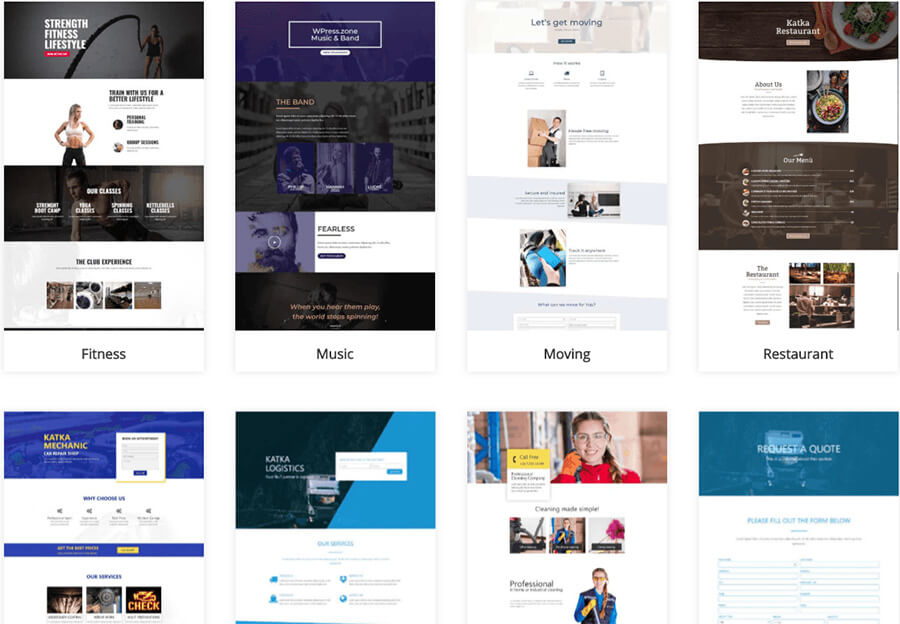
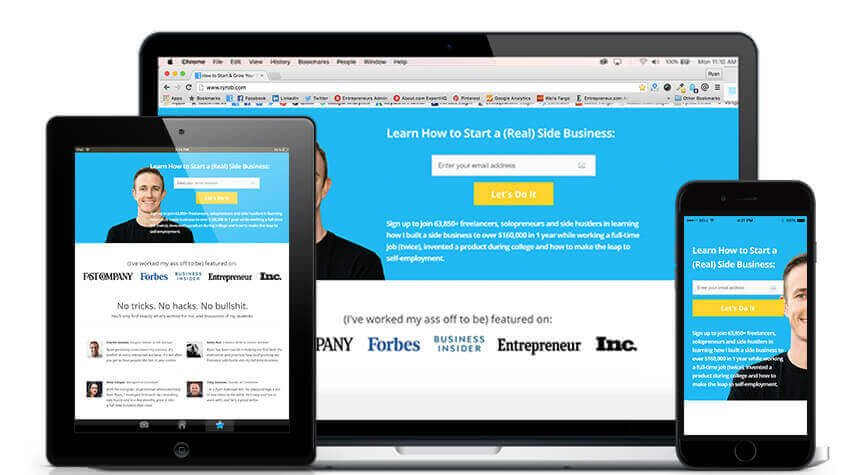
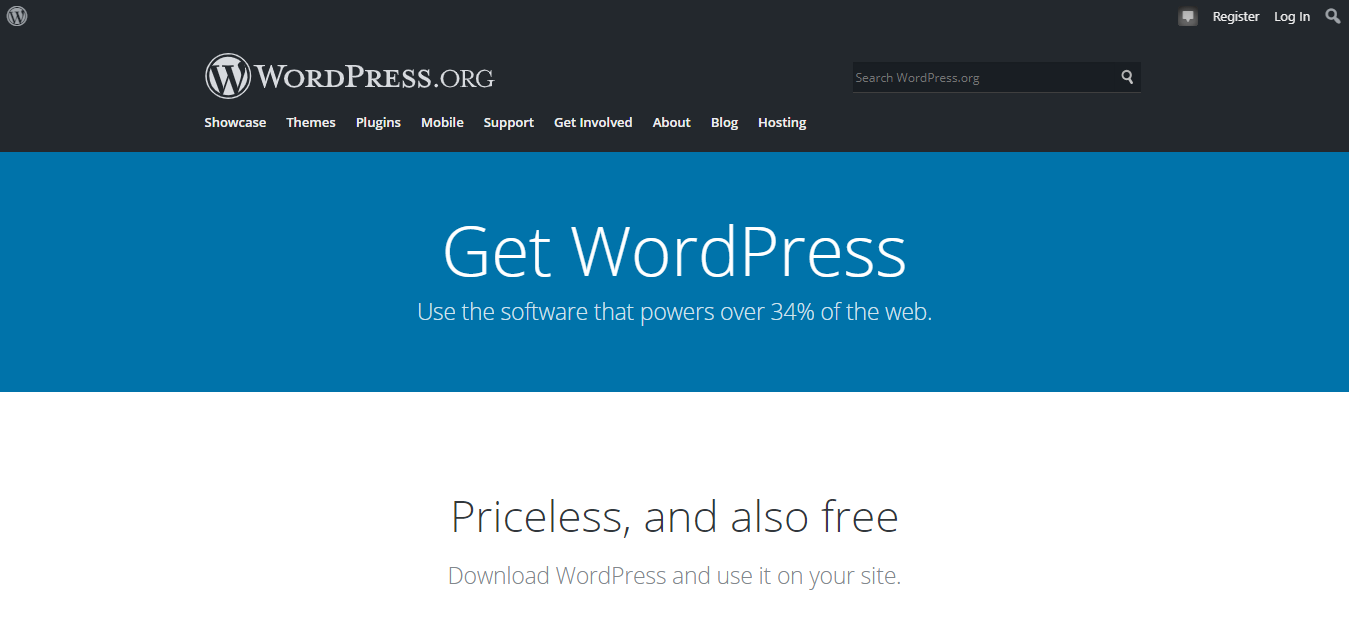

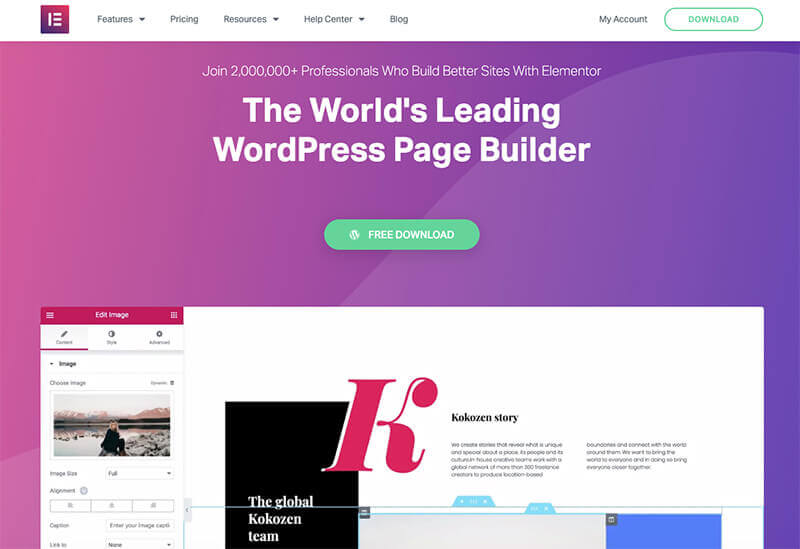


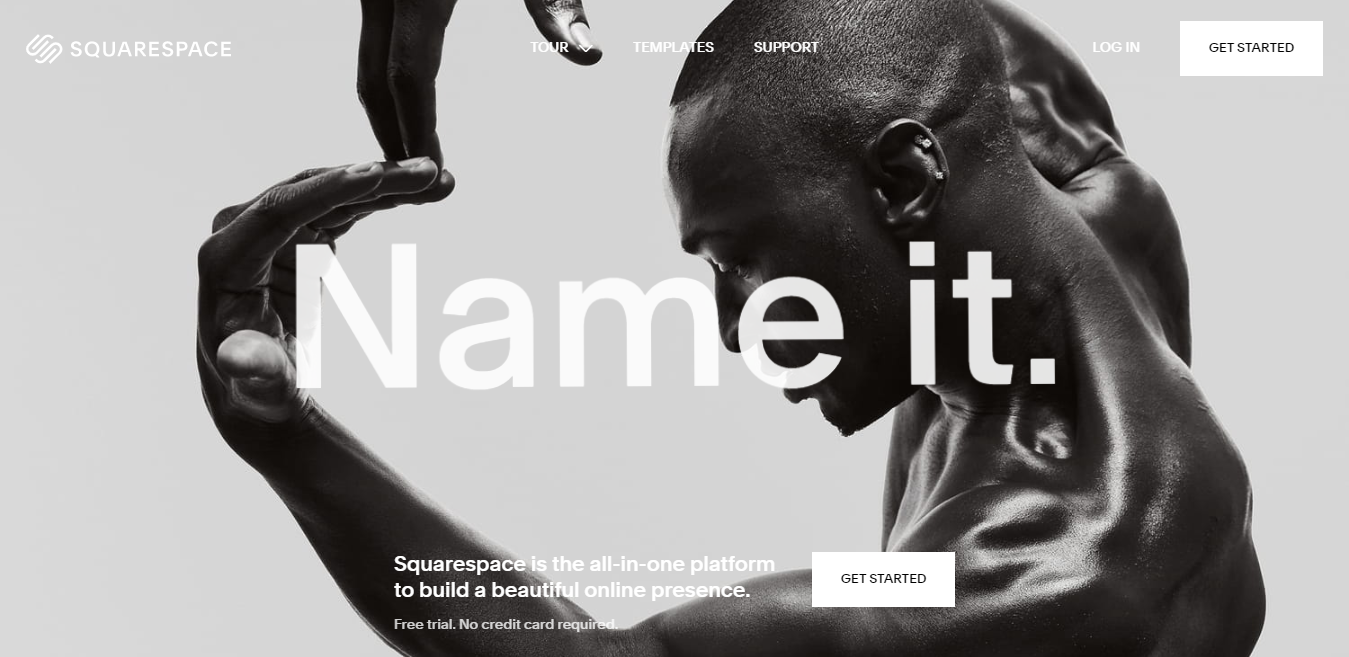

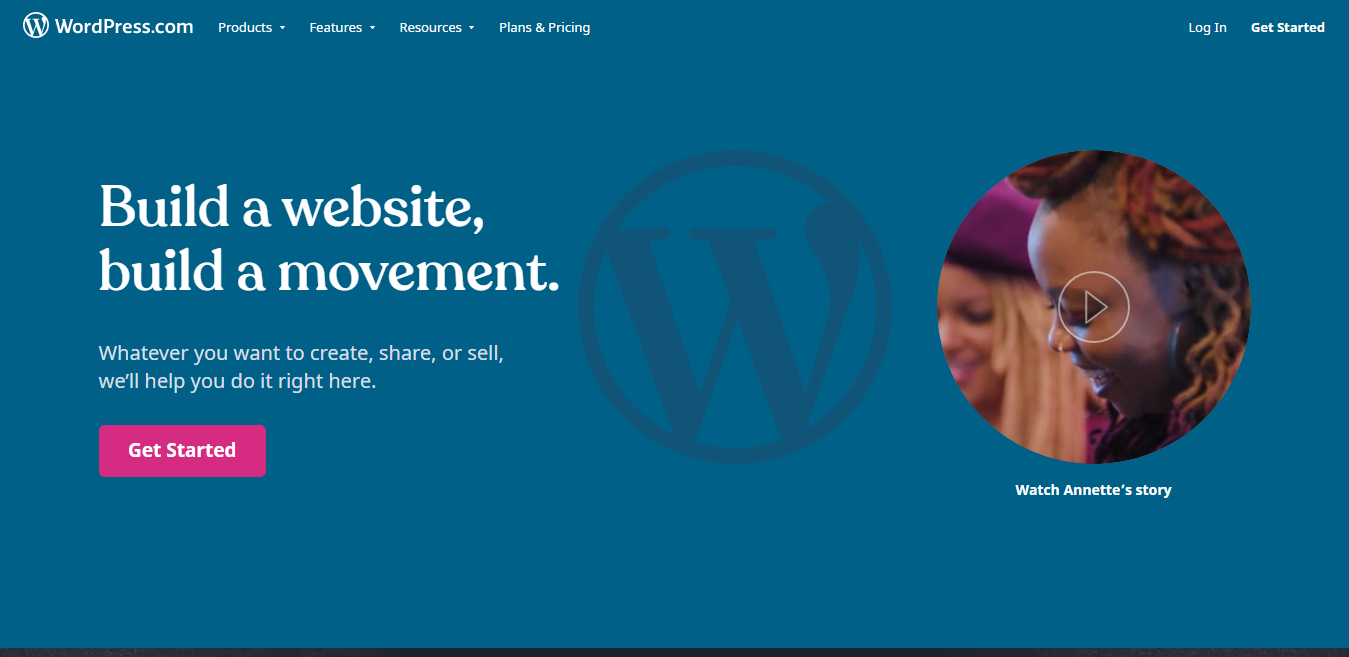

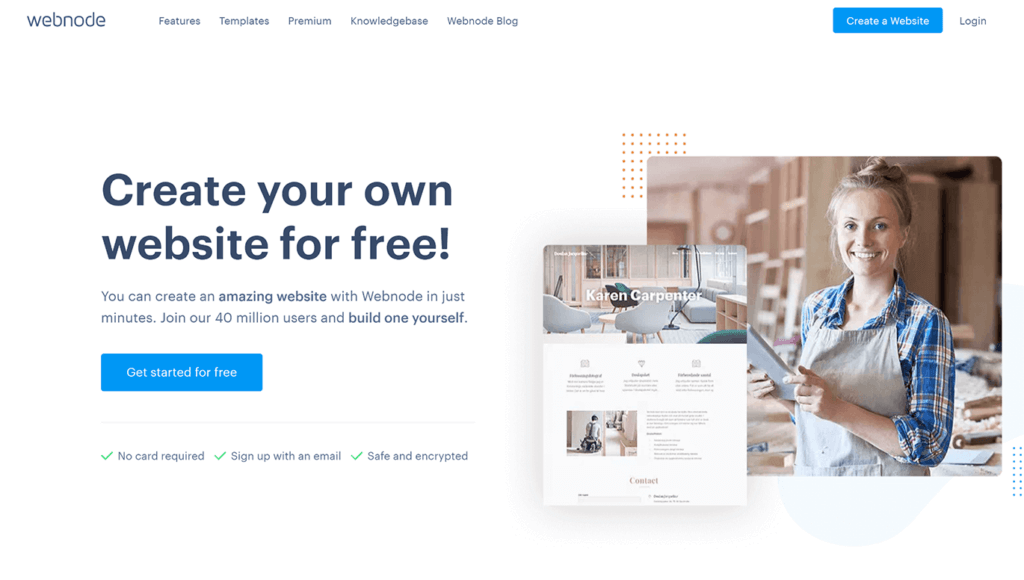
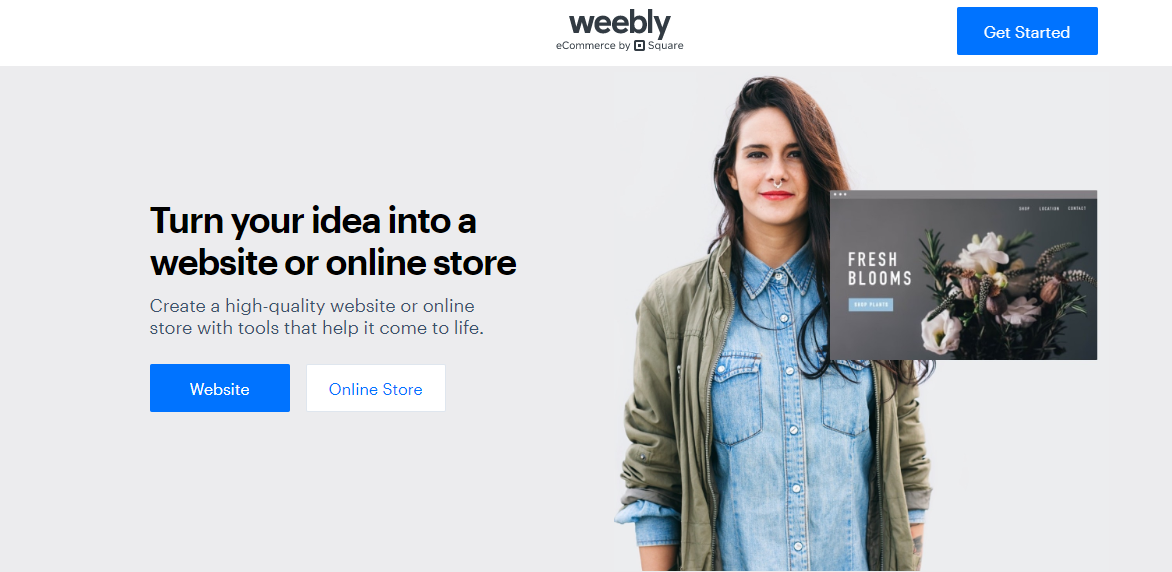
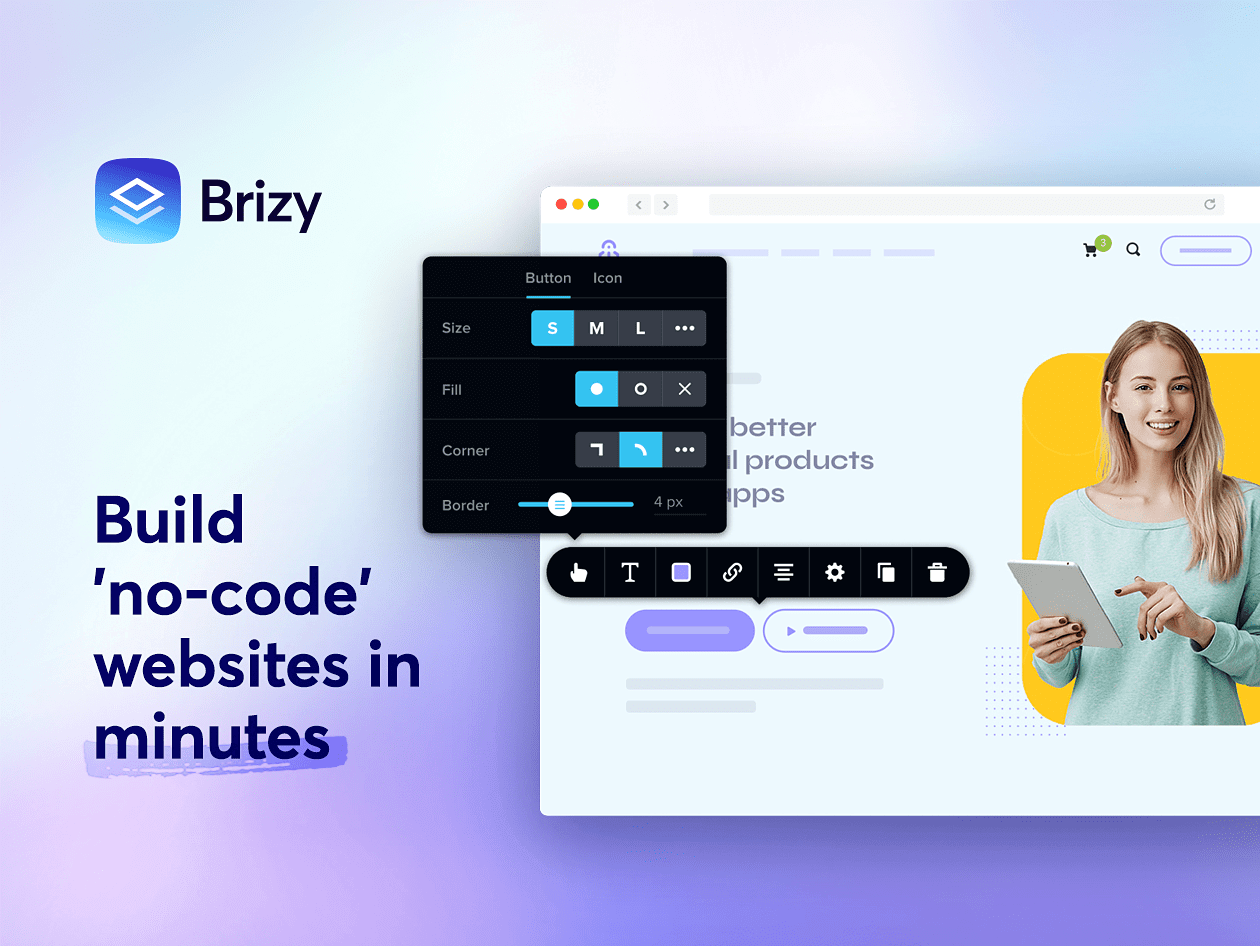


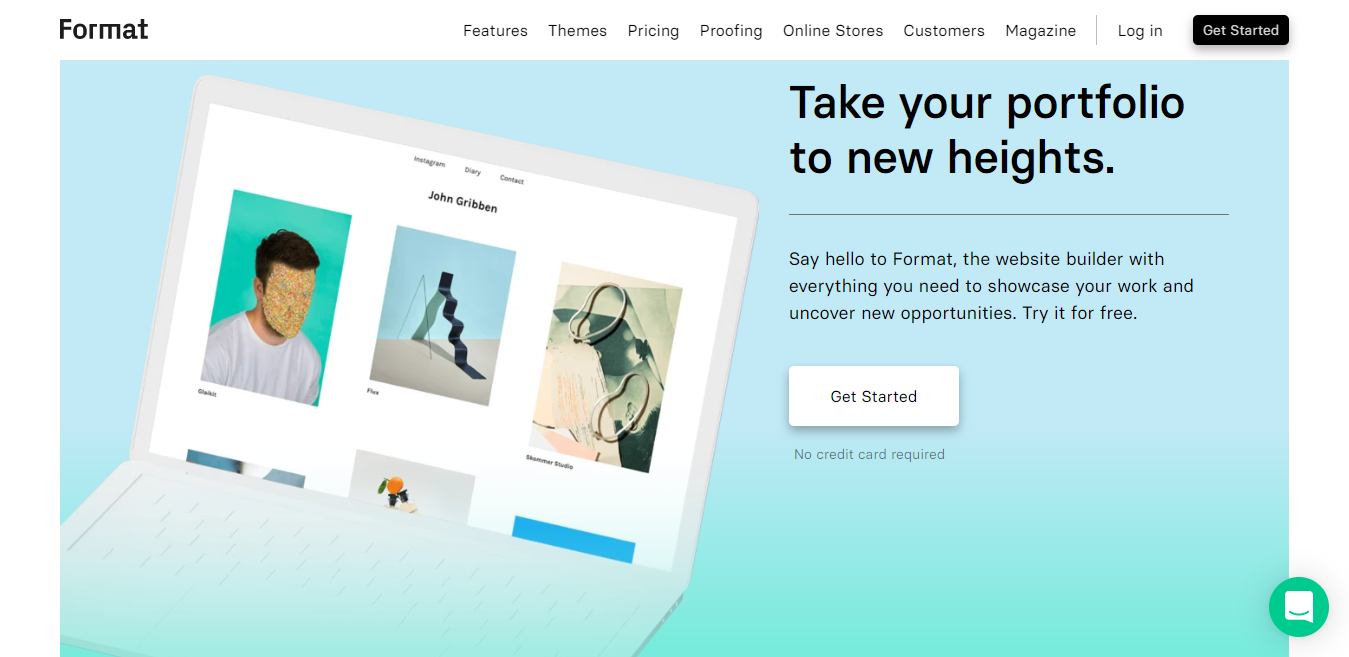
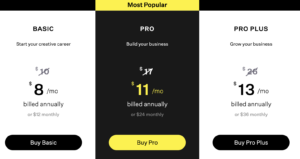
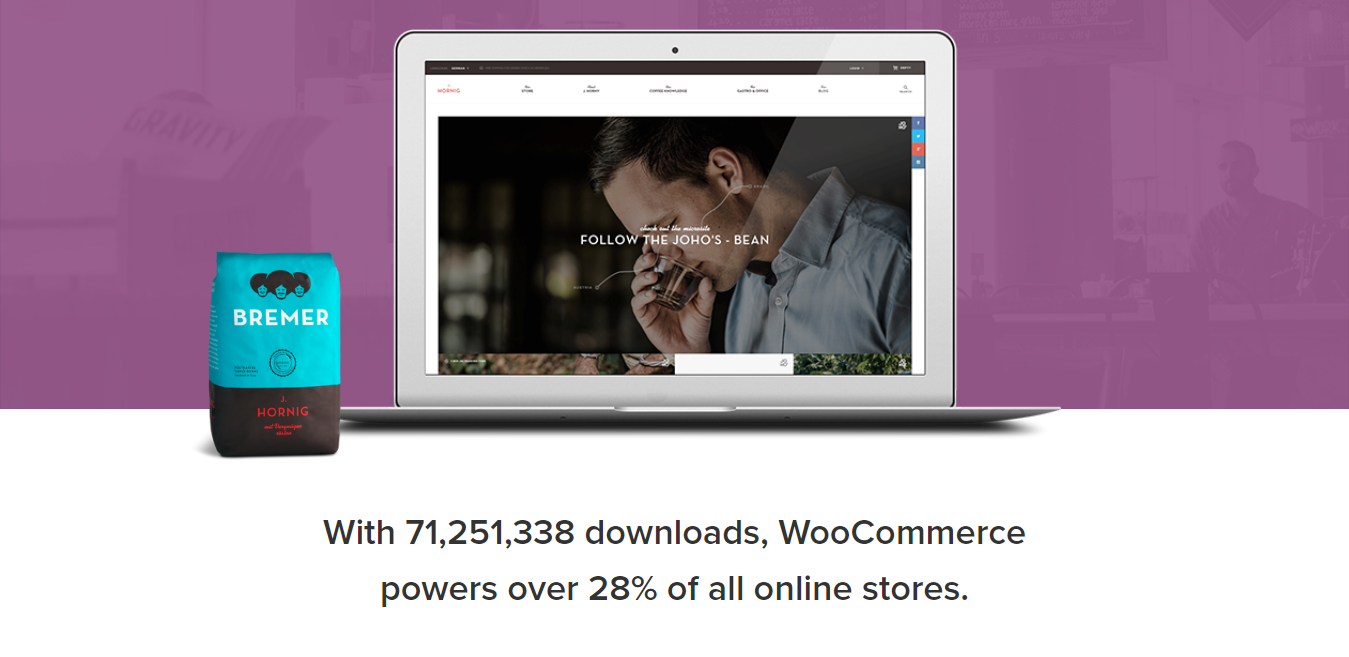
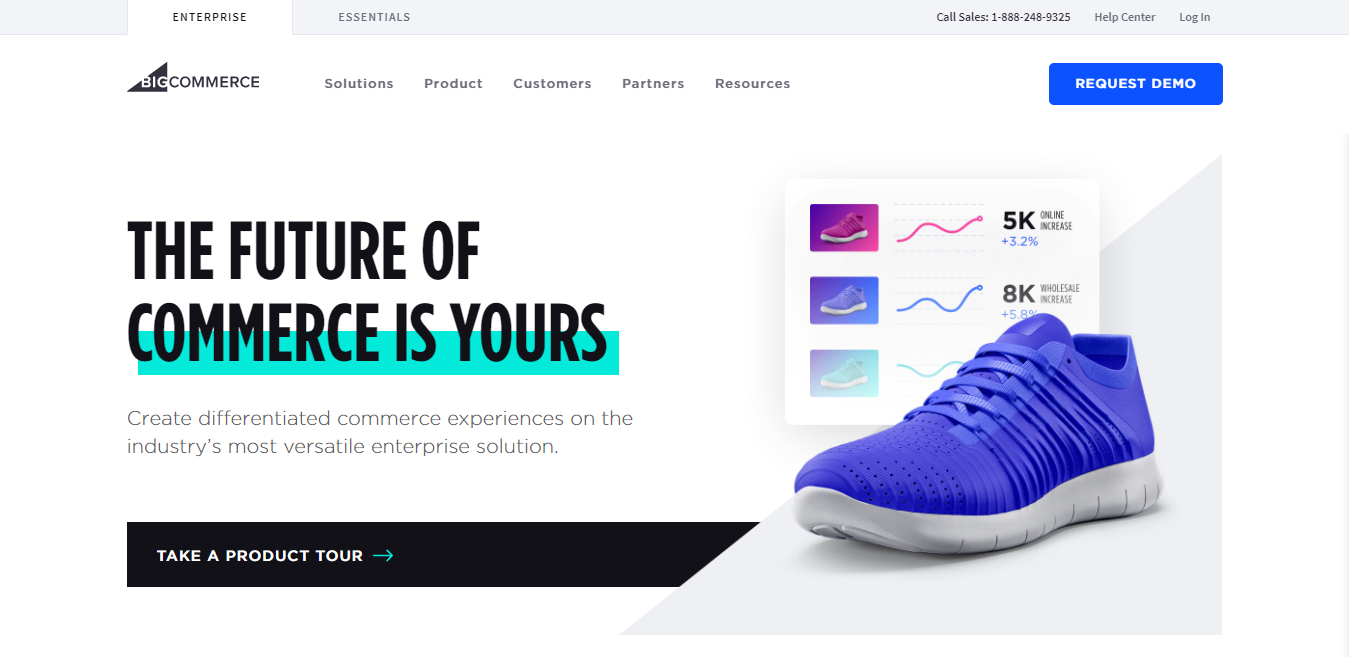
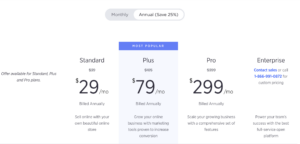
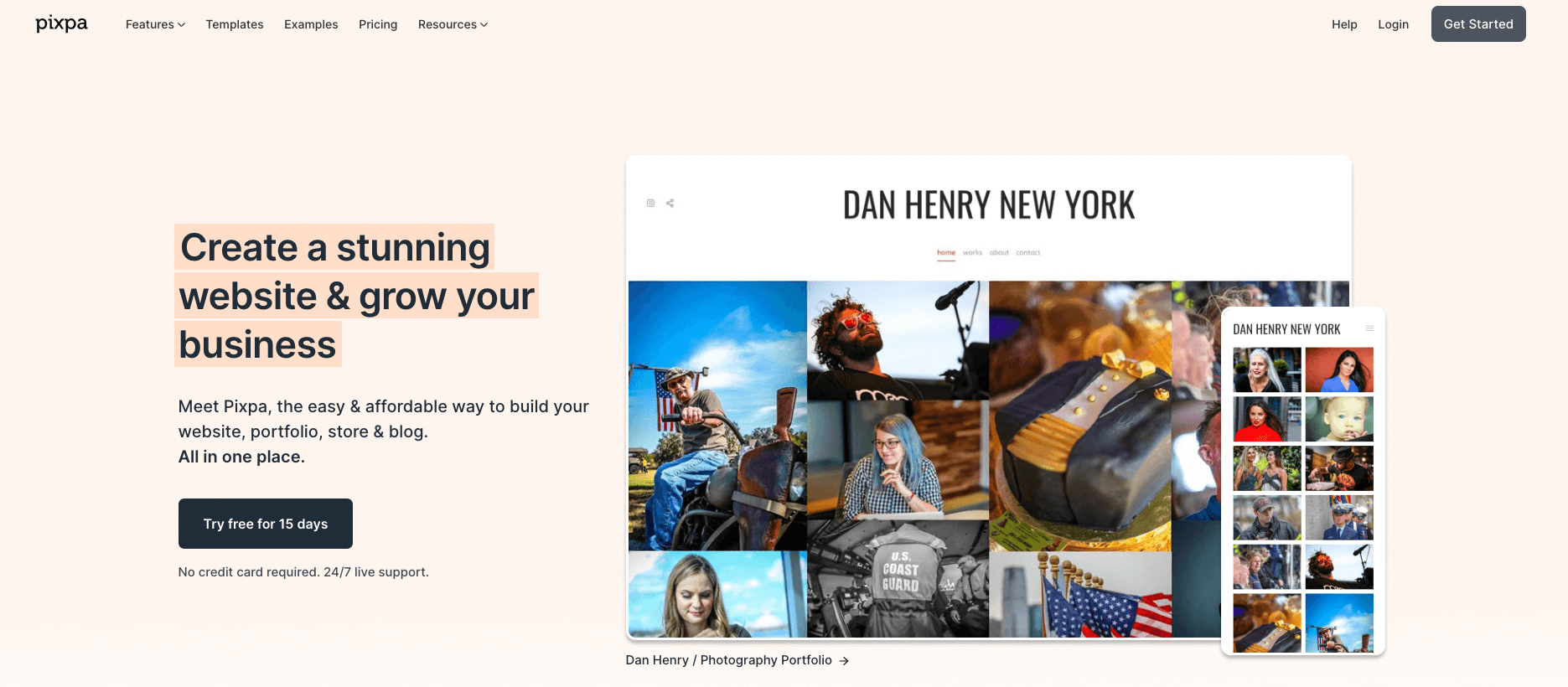


I recommend to everyone to go along with Ryan’s recommendations. Get a dedicated server and install WordPress on the server. Easiest content publishing platform with thousands of free and premium WP plugins to enhance blog functionality! 🙂
🙏
Remember, just like with design or writing, if you can afford it, you will always get a better result partnering with a professional web developer. (disclaimer: I am one)
That being said, another option is Adobe’s portfolio site service, if you already have Creative Cloud it’s included in the cost.
Nice! I’d only somewhat agree with you—while it’s arguable that I could’ve/should’ve hired a web designer to overhaul the visual look of my blog a year or two ago (LOL), I’m only right now starting to kick off this project. Up until today, I’ve grown my blog to a pretty sizable amount of traffic and income with a visual WordPress theme and the occasional help from a technical friend. I think you should be in a position where your website is generating revenue before hiring a web developer just to get a website off the ground (or if you have a substantial business offline to fund a more custom build). Even still, I’d argue that *most* businesses should be on a simple website builder platform like WordPress regardless of who’s building the site.
I’m due for checking out Adobe Portfolio again though, thanks for the tip!
I’m loving this, Ryan!
Thanks for stopping by, Ram!
Hey RYAN ROBINSON ,
Great post with best website builders for business owners & bloggers. It is my first time commenting on your blog post i must say that you have done a fantastic work and suggested great tools to create website.
Websites are truly crucial for any business, as it allows the readers to stay updated and gain several vital information. Hence it is really essential to choose a proper website builder to create an online website.
A website builder is a helpful software tool that allows the user to create a website easily without using any coding skills. It makes our website creating process much easier and with less effort. Using the website builder tools saves our time and also allows us to customize the website according to our own visual styles. Website builders provide us several helpful features like extensive theme, template, image library and fast loading times.
Your each of the suggested website builder tools are effective, helpful and offers great features but i truly like an idea of using Wix, Wordpress.org, square-space, Woo-commerce and Weebly. Also thanks for including the price of each website builder tool. Using these tool will be a great helping hand for
several people, bloggers and business owners.
Truly helpful post and thanks for sharing.
Yes! You’re so welcome, Aadarsh. Appreciate the kind words 🙂
Great explanation as always, thanks!
🙏
Great post with the best website builders for business owners & bloggers. I think you should be in a position where your website is generating revenue before hiring a web developer just to get a website off the ground. Each of the suggested website builder tools is effective, helpful, and offers great features but I truly like the idea of using Wix, WordPress.
I absolutely agree with you there! That’s why self-hosted WordPress has been such a great experience for me over the years… I was able to teach myself how to build out the pages of my blog by using visual page builders like OptimizePress and Elementor long before I was able to hire a web designer & developer to create a more custom-designed site.
i like your blog.
Thanks!
Helpful and informative article, thanks!
🙏
I used WooCommerce in the past and had a good experience with it, but faced one issue. The loading speed of SKU units in WooCommerce is really very slow. I have to wait a long time to lead all my Affiliate products for customer to buy so thats a minus point only.
Also used bigcommerce but the navigation is not that much easy to understand so i leave it.
Which one is your favourite, btw RYAN bro?
More and more these days, I’m liking Shopify the best (if you plan to sell physical product from your website)!
This is an informative post. Got a lot of info and details from here. Thank you for sharing this and looking forward to reading more of your posts.
Thank you!
Hi Rob,
Thanks for the great content! It allowed me to make the push into starting up my own blog with wix! Inspiring information, thanks for sharing your journey
You’re welcome, Abe! Glad to hear that—good luck with your new site too 🙏
Nice content sir, we use WooCommerce too.
That’s great! Love their building tools.
Thank you for such great information about the best website builders to choose from now. It really helps me to increase my knowledge about how I can build and design my website with perfection. Thank You for such a great article.
You’re welcome, Brey! Good luck with your new site 🙂
Stunning work, thank you so much for taking the time to share!
You’re very welcome!
Of the names included in this list, WordPress is definitely the most user-friendly, not to mention prevalent among websites. However, it’s good to have a list of options, as to not stick to a particular one.
Agreed! I’ll almost always recommend WordPress to just about anyone aside from the eCommerce use case.
Your tips are valuable and practically useful.
Glad to hear it, thanks!
Nice Post
Thanks, Riya!
Thank you for this great list
i think wordpress(.com) is the best one
Nice! 🙏